Galera Cluster: MySQL/MariaDB-tietokannan master-master-klusterointi
1 like3,513 views
Lyhyt esitelm├ż suomalaisen Codership Oy:n kehitt├żm├żst├ż Galera-klusterointiohjelmistosta (avointa l├żhdekoodia). Otto Kek├żl├żinen SUSE & OpenSUSE -ilta Solinor Showroom, Helsinki 27.11.2014
1 of 13
Download to read offline
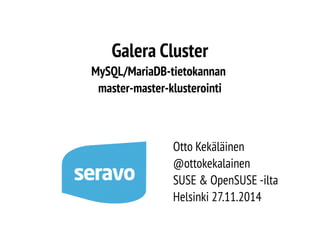

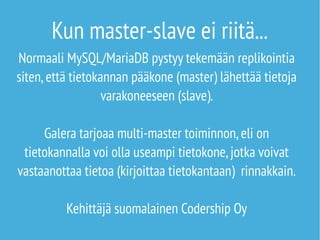
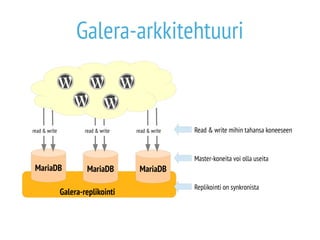
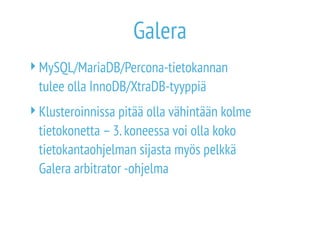
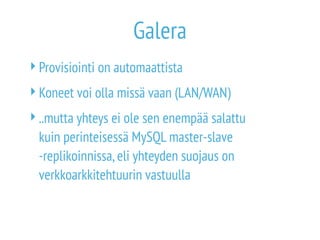
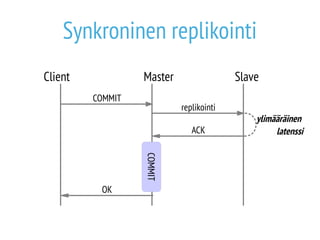
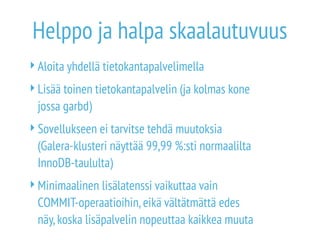
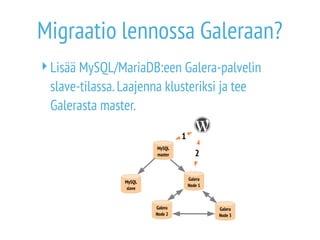
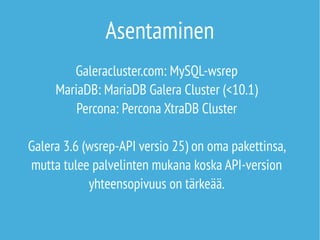
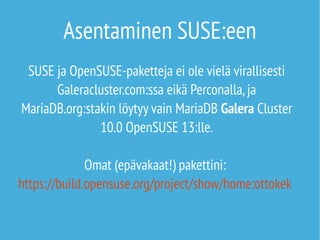
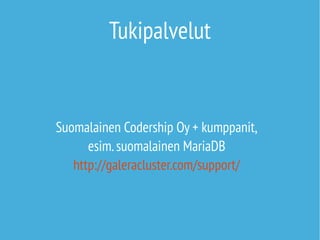
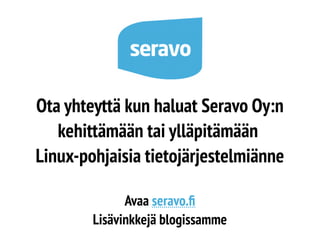
Ad
Recommended
Galera Cluster for MySQL vs MySQL (NDB) Cluster: A High Level Comparison
Galera Cluster for MySQL vs MySQL (NDB) Cluster: A High Level Comparison Severalnines
╠²
The document compares MySQL Cluster (NDB) and Galera for MySQL, outlining their architectures, deployment scenarios, and performance monitoring. MySQL Cluster offers high availability through a distributed architecture and asynchronous/synchronous replication, while Galera supports synchronous multi-master replication with guaranteed write consistency. Key considerations include data migration limitations and management, making it crucial for organizations to assess their requirements carefully when choosing between these two solutions.Galera cluster for MySQL - Introduction ║▌║▌▀Żs
Galera cluster for MySQL - Introduction ║▌║▌▀ŻsSeveralnines
╠²
The document provides an overview of the multi-master synchronous replication feature of the Galera Cluster for MySQL, detailing its setup, concepts, and performance metrics. It covers node provisioning, network partitioning, configuration examples, and best practices for implementing and managing a Galera Cluster. Additionally, it highlights limitations and monitoring needs related to the system.MariaDB Galera Cluster presentation
MariaDB Galera Cluster presentationFrancisco Gon├¦alves
╠²
This document provides an overview and summary of various high availability (HA) solutions for MySQL databases. It begins with an introduction to HA and definitions of key terms. It then discusses MySQL replication, including asynchronous, semi-synchronous, and features in MySQL 5.6 and MariaDB 10.0. Other HA solutions covered include MHA for automated failover, Galera/MariaDB Galera Cluster for synchronous replication, shared disk solutions like DRBD, and MySQL Cluster for in-memory synchronous replication across nodes. The document provides brief descriptions of how each solution works and when it may be applicable.Meetup docker paris
Meetup docker parisAliou BA
╠²
This document discusses containerizing stateful applications using Docker volumes and volume plugins. It provides an overview of local persistent storage options in Docker and their pros and cons. It also discusses solutions like volume plugins from companies like EMC, Microsoft, and VMware. Finally, it announces a demo of running PostgreSQL with Docker Swarm on AWS using the Flocker volume plugin.Portainer
PortainerAnthony Lapenna
╠²
Portainer is an open-source and simple to use UI tool for managing Docker containers and Swarm clusters. It was created in 2016 and is based in New Zealand. Portainer aims to simplify Docker management for all users, not just developers, with a focus on usability. It can deploy in 30 seconds, runs on Linux, Windows and ARM systems, and supports Docker standalone, Swarm, and Swarm mode.Ļ░£ļ░£ņ×ÉĻ░Ć ļÅäņĀäĒĢśļŖö MariaDB ņä£ļ▓äĻĄ¼ņČĢ
Ļ░£ļ░£ņ×ÉĻ░Ć ļÅäņĀäĒĢśļŖö MariaDB ņä£ļ▓äĻĄ¼ņČĢņĀĢĒĢ┤ ņØ┤
╠²
MariaDBņäżņ╣śļ░®ļ▓ĢĻ│╝ Master-Slave, MySQL High Available, Galera ClusterĻĄ¼ņČĢļ░®ļ▓ĢņØä ņĢīņĢäļ│Ėļŗż.Deep Dive Into How To Monitor MySQL or MariaDB Galera Cluster / Percona XtraD...
Deep Dive Into How To Monitor MySQL or MariaDB Galera Cluster / Percona XtraD...Severalnines
╠²
This document provides a comprehensive guide on monitoring Galera clusters, emphasizing the importance of trending systems for database health checks and capacity planning. Key monitoring aspects include cluster status, node performance metrics, and InnoDB-related indicators, highlighting the need for a deep understanding of host metrics and internal processes. The guide also outlines essential tools for monitoring and troubleshooting to ensure optimal cluster performance.Scalable Django Architecture
Scalable Django ArchitectureRami Sayar
╠²
Rami Sayar presented on advanced Django architecture techniques for scaling Django applications in production environments. He discussed load balancing Django across multiple servers using solutions like HAProxy. He also covered caching with Varnish to improve performance, and using Redis or Memcached for caching. Finally, he discussed asynchronous task queues like Celery for processing tasks outside the request-response cycle.FOSDEM2021: MariaDB post-release quality assurance in Debian and Ubuntu
FOSDEM2021: MariaDB post-release quality assurance in Debian and UbuntuOtto Kek├żl├żinen
╠²
The document discusses the quality assurance process for MariaDB in Debian and Ubuntu, highlighting version histories and support statuses. It outlines the Debian packaging workflow, QA tools, and the roles of contributors in maintaining the software. It encourages participation from users and developers in bug reporting, discussions, and contributing to the project.Search in WordPress - how it works and howto customize it
Search in WordPress - how it works and howto customize itOtto Kek├żl├żinen
╠²
The document discusses a webinar on optimizing WordPress performance, focusing on advanced hosting techniques and the effectiveness of various search functionalities within WordPress. It highlights the superiority of Seravo's hosting in terms of speed, presenting data from user measurements. Additionally, it covers the importance of optimizing search functionalities, including the use of custom post types and the limitations of existing search algorithms.MariaDB quality assurance in Debian and Ubuntu
MariaDB quality assurance in Debian and UbuntuOtto Kek├żl├żinen
╠²
The document discusses the state of MariaDB and MySQL in Debian and Ubuntu, detailing the version history and packaging processes. It highlights the role of quality assurance, Debian policies, and various QA systems used to maintain package integrity. Additionally, it invites contributions from the community for developing and maintaining these databases.DebConf 2020: WhatŌĆÖs New in MariaDB Server 10.5 and Galera 4?
DebConf 2020: WhatŌĆÖs New in MariaDB Server 10.5 and Galera 4?Otto Kek├żl├żinen
╠²
The document outlines the state of MariaDB 10.5 and Galera 4 in Debian, detailing compatibility with MySQL and recent enhancements. MariaDB is positioned as a backward-compatible alternative to MySQL, with improvements introduced in version 10.5 including new database commands, performance optimizations, and new security features. The presentation also highlights the ongoing development efforts and invites community participation for both new contributions and maintenance of existing packages.Technical SEO for WordPress - 2019 edition
Technical SEO for WordPress - 2019 editionOtto Kek├żl├żinen
╠²
The document discusses the importance of technical SEO for WordPress beyond basic plugins like Yoast, emphasizing a good site structure, relevant content, and responsiveness. It outlines SEO maturity levels, recommendations for plugins, and the significance of adhering to semantic standards. The author underscores the need for ongoing maintenance and quality hosting to optimize organic search rankings effectively.The 5 most common reasons for a slow WordPress site and how to fix them ŌĆō ext...
The 5 most common reasons for a slow WordPress site and how to fix them ŌĆō ext...Otto Kek├żl├żinen
╠²
The document identifies the five most common reasons for slow WordPress sites, including large image files, excessive HTTP requests, and suboptimal web server performance. It provides solutions such as optimizing images, minimizing unnecessary plugins, and ensuring efficient caching. Furthermore, it emphasizes the importance of code efficiency and suggests tools to help diagnose and resolve performance issues.How MariaDB packaging uses Salsa-CI to ensure smooth upgrades and avoid regre...
How MariaDB packaging uses Salsa-CI to ensure smooth upgrades and avoid regre...Otto Kek├żl├żinen
╠²
This document discusses how MariaDB in Debian uses the Salsa-CI/Gitlab-CI infrastructure to ensure smooth upgrades and avoid regressions. It describes how the MariaDB packaging repositories were moved to Salsa.Debian.org and how a custom Gitlab-CI pipeline with 18 jobs over 5 stages was created to build, test, and simulate upgrades from various versions. This comprehensive continuous integration process helps catch issues early and improve the quality and reliability of MariaDB upgrades. Challenges in testing such a large and complex package are also discussed.DebConf 2019 MariaDB packaging in Debian BoF
DebConf 2019 MariaDB packaging in Debian BoFOtto Kek├żl├żinen
╠²
This document discusses the state of MariaDB and MySQL packaging in Debian. MariaDB 10.3 is included in the latest stable Debian release, and 10.4 will be uploaded soon. MySQL 5.7 is available in unstable but not stable releases. There is ongoing work to maintain older MariaDB versions and develop new packages. Contributors are encouraged to participate in bug triage and discussions to help address stale bugs without coding skills.The 5 most common reasons for a slow WordPress site and how to fix them
The 5 most common reasons for a slow WordPress site and how to fix themOtto Kek├żl├żinen
╠²
The document outlines the five most common reasons for a slow WordPress site: unnecessarily large image files, excessive HTTP requests, slow web servers, malfunctioning caches, and overly complex code. Each reason is addressed with potential solutions, including image optimization techniques, plugin management, optimizing server performance, ensuring effective caching, and code profiling. The guidance encourages WordPress users to focus on quality hosting and efficient coding practices to improve site speed.How to investigate and recover from a security breach in WordPress
How to investigate and recover from a security breach in WordPressOtto Kek├żl├żinen
╠²
This document summarizes Otto Kek├żl├żinen's talk about investigating and recovering from a WordPress security breach at his company Seravo. On November 9th, 2018 four WordPress sites hosted by Seravo were compromised due to a vulnerability in the WP GDPR Compliance plugin. Seravo's security team launched an investigation that uncovered malicious user accounts, identified the vulnerable plugin as the entry point, and cleaned up the sites. The experience highlighted the importance of having an incident response plan even when security best practices are followed.Technical SEO for WordPress
Technical SEO for WordPressOtto Kek├żl├żinen
╠²
The document discusses the importance of technical SEO for WordPress, emphasizing that simply installing Yoast SEO is not sufficient for achieving strong organic search rankings. It highlights the significance of substantial content, relevance, and proper site's technical setup, including mobile optimization and semantic markup. The author promotes the use of alternatives to Yoast, such as SEO Framework and Polylang for multilingual support, while recommending best practices for managing site performance and security.Automatic testing and quality assurance for WordPress plugins and themes
Automatic testing and quality assurance for WordPress plugins and themesOtto Kek├żl├żinen
╠²
The document discusses automatic testing and quality assurance for WordPress plugins and themes, emphasizing the importance of utilizing tools like PHP Code Sniffer, PHPUnit, and continuous integration platforms to ensure code quality. It presents various methods for automating tests and quality checks, such as using Git hooks and Travis CI, alongside best practices for performance monitoring and visual regression testing. The ultimate goal is to enhance the reputation of WordPress plugins by demonstrating reliable quality through automation in the development process.10 things every developer should know about their database to run word press ...
10 things every developer should know about their database to run word press ...Otto Kek├żl├żinen
╠²
The document presents essential tips for optimizing WordPress databases, shared by Otto Kek├żl├żinen at WordCamp Barcelona 2018. Key recommendations include creating database backups, utilizing WP-CLI for managing database tasks, and understanding the significance of autoload options in the wp_options table. Additionally, it emphasizes learning SQL, proper database configurations, and regular performance monitoring to maintain an efficient WordPress environment.Automatic testing and quality assurance for WordPress plugins
Automatic testing and quality assurance for WordPress pluginsOtto Kek├żl├żinen
╠²
The document discusses the importance of automatic testing and quality assurance for WordPress plugins, highlighting the tools and techniques used for code analysis, unit tests, and integration tests. It covers specific tools like PHP Code Sniffer and PhantomJS, alongside automation strategies using Git hooks and continuous integration with Travis CI. The document emphasizes the need for improved quality in WordPress plugins and provides resources for developers to adopt these practices effectively.Improving WordPress performance (xdebug and profiling)
Improving WordPress performance (xdebug and profiling)Otto Kek├żl├żinen
╠²
The document discusses optimizing WordPress performance using methods like measuring, optimizing, validating, and repeating the process. It highlights common challenges such as security and speed, provides tools for measuring performance, and shares techniques for identifying bottlenecks using tools like Xdebug and WP-CLI. Additionally, it includes a case study to demonstrate the effectiveness of optimizations made to the Twenty Seventeen theme.WordPress-tietoturvan perusteet
WordPress-tietoturvan perusteetOtto Kek├żl├żinen
╠²
WordPressin tietoturva: Mik├ż on olennaista ŌĆō ja mik├ż ei?
Esitys WP Sein├żjoki Meetupissa 28.11.2017
Tietoa kaikille jotka omistavat WordPress-sivuston tai kehitt├żv├żt WordPress-sivustoja.
Technical SEO for WordPress - 2017 edition
Technical SEO for WordPress - 2017 editionOtto Kek├żl├żinen
╠²
The document discusses the importance of technical SEO for WordPress sites, emphasizing that installing plugins like Yoast SEO is not sufficient for optimal search engine performance. It outlines key SEO strategies, such as the use of semantic markup and ensuring site responsiveness, while recommending alternatives to Yoast, like the SEO Framework, for better efficiency. Additionally, it stresses the need for reliable hosting and upkeep to maintain site performance and improve organic search rankings.Improving WordPress Performance with Xdebug and PHP Profiling
Improving WordPress Performance with Xdebug and PHP ProfilingOtto Kek├żl├żinen
╠²
The document outlines a presentation by Otto Kek├żl├żinen on improving WordPress performance at WordCamp Europe 2017. It includes steps for optimizing website speed, such as measuring current performance, identifying bottlenecks using tools like Xdebug, and validating enhancements. The speaker emphasizes the importance of following a methodical approach to achieve significant performance improvements, showcasing a practical demonstration of optimizing the Twenty Seventeen theme.MariaDB adoption in Linux distributions and development environments
MariaDB adoption in Linux distributions and development environmentsOtto Kek├żl├żinen
╠²
The document outlines the mission and achievements of the MariaDB Foundation, which focuses on ensuring the continuity, open collaboration, and widespread adoption of MariaDB as an open-source database solution. It highlights the foundation's development work, staff contributions, and successes in increasing community engagement and software capabilities. Additionally, it discusses MariaDB's adoption in various Linux distributions and development environments, emphasizing its importance in the open-source ecosystem.WordPress security 101 - WP Jyv├żskyl├ż Meetup 21.3.2017
WordPress security 101 - WP Jyv├żskyl├ż Meetup 21.3.2017Otto Kek├żl├żinen
╠²
WordPress security involves critical aspects like confidentiality, integrity, and availability to prevent unauthorized access and attacks. Key recommendations include maintaining password hygiene, using HTTPS, minimizing software vulnerabilities, keeping plugins updated, and implementing a reliable backup system. The document stresses that neglecting security can lead to serious consequences, including reputation damage and potential legal issues.More Related Content
More from Otto Kek├żl├żinen (20)
FOSDEM2021: MariaDB post-release quality assurance in Debian and Ubuntu
FOSDEM2021: MariaDB post-release quality assurance in Debian and UbuntuOtto Kek├żl├żinen
╠²
The document discusses the quality assurance process for MariaDB in Debian and Ubuntu, highlighting version histories and support statuses. It outlines the Debian packaging workflow, QA tools, and the roles of contributors in maintaining the software. It encourages participation from users and developers in bug reporting, discussions, and contributing to the project.Search in WordPress - how it works and howto customize it
Search in WordPress - how it works and howto customize itOtto Kek├żl├żinen
╠²
The document discusses a webinar on optimizing WordPress performance, focusing on advanced hosting techniques and the effectiveness of various search functionalities within WordPress. It highlights the superiority of Seravo's hosting in terms of speed, presenting data from user measurements. Additionally, it covers the importance of optimizing search functionalities, including the use of custom post types and the limitations of existing search algorithms.MariaDB quality assurance in Debian and Ubuntu
MariaDB quality assurance in Debian and UbuntuOtto Kek├żl├żinen
╠²
The document discusses the state of MariaDB and MySQL in Debian and Ubuntu, detailing the version history and packaging processes. It highlights the role of quality assurance, Debian policies, and various QA systems used to maintain package integrity. Additionally, it invites contributions from the community for developing and maintaining these databases.DebConf 2020: WhatŌĆÖs New in MariaDB Server 10.5 and Galera 4?
DebConf 2020: WhatŌĆÖs New in MariaDB Server 10.5 and Galera 4?Otto Kek├żl├żinen
╠²
The document outlines the state of MariaDB 10.5 and Galera 4 in Debian, detailing compatibility with MySQL and recent enhancements. MariaDB is positioned as a backward-compatible alternative to MySQL, with improvements introduced in version 10.5 including new database commands, performance optimizations, and new security features. The presentation also highlights the ongoing development efforts and invites community participation for both new contributions and maintenance of existing packages.Technical SEO for WordPress - 2019 edition
Technical SEO for WordPress - 2019 editionOtto Kek├żl├żinen
╠²
The document discusses the importance of technical SEO for WordPress beyond basic plugins like Yoast, emphasizing a good site structure, relevant content, and responsiveness. It outlines SEO maturity levels, recommendations for plugins, and the significance of adhering to semantic standards. The author underscores the need for ongoing maintenance and quality hosting to optimize organic search rankings effectively.The 5 most common reasons for a slow WordPress site and how to fix them ŌĆō ext...
The 5 most common reasons for a slow WordPress site and how to fix them ŌĆō ext...Otto Kek├żl├żinen
╠²
The document identifies the five most common reasons for slow WordPress sites, including large image files, excessive HTTP requests, and suboptimal web server performance. It provides solutions such as optimizing images, minimizing unnecessary plugins, and ensuring efficient caching. Furthermore, it emphasizes the importance of code efficiency and suggests tools to help diagnose and resolve performance issues.How MariaDB packaging uses Salsa-CI to ensure smooth upgrades and avoid regre...
How MariaDB packaging uses Salsa-CI to ensure smooth upgrades and avoid regre...Otto Kek├żl├żinen
╠²
This document discusses how MariaDB in Debian uses the Salsa-CI/Gitlab-CI infrastructure to ensure smooth upgrades and avoid regressions. It describes how the MariaDB packaging repositories were moved to Salsa.Debian.org and how a custom Gitlab-CI pipeline with 18 jobs over 5 stages was created to build, test, and simulate upgrades from various versions. This comprehensive continuous integration process helps catch issues early and improve the quality and reliability of MariaDB upgrades. Challenges in testing such a large and complex package are also discussed.DebConf 2019 MariaDB packaging in Debian BoF
DebConf 2019 MariaDB packaging in Debian BoFOtto Kek├żl├żinen
╠²
This document discusses the state of MariaDB and MySQL packaging in Debian. MariaDB 10.3 is included in the latest stable Debian release, and 10.4 will be uploaded soon. MySQL 5.7 is available in unstable but not stable releases. There is ongoing work to maintain older MariaDB versions and develop new packages. Contributors are encouraged to participate in bug triage and discussions to help address stale bugs without coding skills.The 5 most common reasons for a slow WordPress site and how to fix them
The 5 most common reasons for a slow WordPress site and how to fix themOtto Kek├żl├żinen
╠²
The document outlines the five most common reasons for a slow WordPress site: unnecessarily large image files, excessive HTTP requests, slow web servers, malfunctioning caches, and overly complex code. Each reason is addressed with potential solutions, including image optimization techniques, plugin management, optimizing server performance, ensuring effective caching, and code profiling. The guidance encourages WordPress users to focus on quality hosting and efficient coding practices to improve site speed.How to investigate and recover from a security breach in WordPress
How to investigate and recover from a security breach in WordPressOtto Kek├żl├żinen
╠²
This document summarizes Otto Kek├żl├żinen's talk about investigating and recovering from a WordPress security breach at his company Seravo. On November 9th, 2018 four WordPress sites hosted by Seravo were compromised due to a vulnerability in the WP GDPR Compliance plugin. Seravo's security team launched an investigation that uncovered malicious user accounts, identified the vulnerable plugin as the entry point, and cleaned up the sites. The experience highlighted the importance of having an incident response plan even when security best practices are followed.Technical SEO for WordPress
Technical SEO for WordPressOtto Kek├żl├żinen
╠²
The document discusses the importance of technical SEO for WordPress, emphasizing that simply installing Yoast SEO is not sufficient for achieving strong organic search rankings. It highlights the significance of substantial content, relevance, and proper site's technical setup, including mobile optimization and semantic markup. The author promotes the use of alternatives to Yoast, such as SEO Framework and Polylang for multilingual support, while recommending best practices for managing site performance and security.Automatic testing and quality assurance for WordPress plugins and themes
Automatic testing and quality assurance for WordPress plugins and themesOtto Kek├żl├żinen
╠²
The document discusses automatic testing and quality assurance for WordPress plugins and themes, emphasizing the importance of utilizing tools like PHP Code Sniffer, PHPUnit, and continuous integration platforms to ensure code quality. It presents various methods for automating tests and quality checks, such as using Git hooks and Travis CI, alongside best practices for performance monitoring and visual regression testing. The ultimate goal is to enhance the reputation of WordPress plugins by demonstrating reliable quality through automation in the development process.10 things every developer should know about their database to run word press ...
10 things every developer should know about their database to run word press ...Otto Kek├żl├żinen
╠²
The document presents essential tips for optimizing WordPress databases, shared by Otto Kek├żl├żinen at WordCamp Barcelona 2018. Key recommendations include creating database backups, utilizing WP-CLI for managing database tasks, and understanding the significance of autoload options in the wp_options table. Additionally, it emphasizes learning SQL, proper database configurations, and regular performance monitoring to maintain an efficient WordPress environment.Automatic testing and quality assurance for WordPress plugins
Automatic testing and quality assurance for WordPress pluginsOtto Kek├żl├żinen
╠²
The document discusses the importance of automatic testing and quality assurance for WordPress plugins, highlighting the tools and techniques used for code analysis, unit tests, and integration tests. It covers specific tools like PHP Code Sniffer and PhantomJS, alongside automation strategies using Git hooks and continuous integration with Travis CI. The document emphasizes the need for improved quality in WordPress plugins and provides resources for developers to adopt these practices effectively.Improving WordPress performance (xdebug and profiling)
Improving WordPress performance (xdebug and profiling)Otto Kek├żl├żinen
╠²
The document discusses optimizing WordPress performance using methods like measuring, optimizing, validating, and repeating the process. It highlights common challenges such as security and speed, provides tools for measuring performance, and shares techniques for identifying bottlenecks using tools like Xdebug and WP-CLI. Additionally, it includes a case study to demonstrate the effectiveness of optimizations made to the Twenty Seventeen theme.WordPress-tietoturvan perusteet
WordPress-tietoturvan perusteetOtto Kek├żl├żinen
╠²
WordPressin tietoturva: Mik├ż on olennaista ŌĆō ja mik├ż ei?
Esitys WP Sein├żjoki Meetupissa 28.11.2017
Tietoa kaikille jotka omistavat WordPress-sivuston tai kehitt├żv├żt WordPress-sivustoja.
Technical SEO for WordPress - 2017 edition
Technical SEO for WordPress - 2017 editionOtto Kek├żl├żinen
╠²
The document discusses the importance of technical SEO for WordPress sites, emphasizing that installing plugins like Yoast SEO is not sufficient for optimal search engine performance. It outlines key SEO strategies, such as the use of semantic markup and ensuring site responsiveness, while recommending alternatives to Yoast, like the SEO Framework, for better efficiency. Additionally, it stresses the need for reliable hosting and upkeep to maintain site performance and improve organic search rankings.Improving WordPress Performance with Xdebug and PHP Profiling
Improving WordPress Performance with Xdebug and PHP ProfilingOtto Kek├żl├żinen
╠²
The document outlines a presentation by Otto Kek├żl├żinen on improving WordPress performance at WordCamp Europe 2017. It includes steps for optimizing website speed, such as measuring current performance, identifying bottlenecks using tools like Xdebug, and validating enhancements. The speaker emphasizes the importance of following a methodical approach to achieve significant performance improvements, showcasing a practical demonstration of optimizing the Twenty Seventeen theme.MariaDB adoption in Linux distributions and development environments
MariaDB adoption in Linux distributions and development environmentsOtto Kek├żl├żinen
╠²
The document outlines the mission and achievements of the MariaDB Foundation, which focuses on ensuring the continuity, open collaboration, and widespread adoption of MariaDB as an open-source database solution. It highlights the foundation's development work, staff contributions, and successes in increasing community engagement and software capabilities. Additionally, it discusses MariaDB's adoption in various Linux distributions and development environments, emphasizing its importance in the open-source ecosystem.WordPress security 101 - WP Jyv├żskyl├ż Meetup 21.3.2017
WordPress security 101 - WP Jyv├żskyl├ż Meetup 21.3.2017Otto Kek├żl├żinen
╠²
WordPress security involves critical aspects like confidentiality, integrity, and availability to prevent unauthorized access and attacks. Key recommendations include maintaining password hygiene, using HTTPS, minimizing software vulnerabilities, keeping plugins updated, and implementing a reliable backup system. The document stresses that neglecting security can lead to serious consequences, including reputation damage and potential legal issues.The 5 most common reasons for a slow WordPress site and how to fix them ŌĆō ext...
The 5 most common reasons for a slow WordPress site and how to fix them ŌĆō ext...Otto Kek├żl├żinen
╠²
Galera Cluster: MySQL/MariaDB-tietokannan master-master-klusterointi
- 1. Galera Cluster MySQL/MariaDB-tietokannan master-master-klusterointi Otto Kek├żl├żinen @ottokekalainen SUSE & OpenSUSE -ilta Helsinki 27.11.2014
- 2. LINUX-JÄRJESTELMIEN ASIANTUNTIJA- JA TUKIPALVELUT
- 3. Kun master-slave ei riit├ż... Normaali MySQL/MariaDB pystyy tekem├ż├żn replikointia siten, ett├ż tietokannan p├ż├żkone (master) l├żhett├ż├ż tietoja varakoneeseen (slave). Galera tarjoaa multi-master toiminnon, eli on tietokannalla voi olla useampi tietokone, jotka voivat vastaanottaa tietoa (kirjoittaa tietokantaan) rinnakkain. Kehitt├żj├ż suomalainen Codership Oy
- 4. Galera-arkkitehtuuri read & write read & write read & write MariaDB MariaDB MariaDB Read & write mihin tahansa koneeseen Master-koneita voi olla useita Galera-replikointi Replikointi on synkronista
- 5. Galera ŅīōMySQL/MariaDB/Percona-tietokannan tulee olla InnoDB/XtraDB-tyyppi├ż ŅīōKlusteroinnissa pit├ż├ż olla v├żhint├ż├żn kolme tietokonetta ŌĆō 3. koneessa voi olla koko tietokantaohjelman sijasta my├Čs pelkk├ż Galera arbitrator -ohjelma
- 6. Galera ŅīōProvisiointi on automaattista ŅīōKoneet voi olla miss├ż vaan (LAN/WAN) ŅīōGalerassa on SSL/TLS-tuki, jonka voi tarvittaessa kytke├ż p├ż├żlle
- 7. Synkroninen replikointi Client Master Slave COMMIT replikointi ACK OK COMMIT ylim├ż├żr├żinen latenssi
- 8. Helppo ja halpa skaalautuvuus ŅīōAloita yhdell├ż tietokantapalvelimella ŅīōLis├ż├ż toinen tietokantapalvelin (ja kolmas kone jossa garbd) ŅīōSovellukseen ei tarvitse tehd├ż muutoksia (Galera-klusteri n├żytt├ż├ż 99,99 %:sti normaalilta InnoDB-taululta) ŅīōMinimaalinen lis├żlatenssi vaikuttaa vain COMMIT-operaatioihin, eik├ż v├żlt├żtm├żtt├ż edes n├ży, koska lis├żpalvelin nopeuttaa kaikkea muuta
- 9. Migraatio lennossa Galeraan? ŅīōLis├ż├ż MySQL/MariaDB:een Galera-palvelin slave-tilassa. Laajenna klusteriksi ja tee Galerasta master. MySQL slave MySQL master Galera Node 1 Galera Node 2 Galera Node 3 1 2
- 10. Asentaminen Galeracluster.com: MySQL-wsrep MariaDB: MariaDB Galera Cluster (<10.1) Percona: Percona XtraDB Cluster Galera 3.6 (wsrep-API versio 25) on oma pakettinsa, mutta tulee palvelinten mukana koska API-version yhteensopivuus on t├żrke├ż├ż.
- 11. Asentaminen SUSE:een SUSE ja OpenSUSE-paketteja ei ole viel├ż virallisesti Galeracluster.com:ssa eik├ż Perconalla, ja MariaDB.org:stakin l├Čytyy vain MariaDB Galera Cluster 10.0 OpenSUSE 13:lle. Omat (ep├żvakaat!) pakettini: https://build.opensuse.org/project/show/home:ottokek
- 12. Tukipalvelut Suomalainen Codership Oy + kumppanit, esim. suomalainen MariaDB http://galeracluster.com/support/
- 13. Ota yhteytt├ż kun haluat Seravo Oy:n kehitt├żm├ż├żn tai yll├żpit├żm├ż├żn Linux-pohjaisia tietoj├żrjestelmi├żnne Avaa seravo.f Lis├żvinkkej├ż blogissamme
